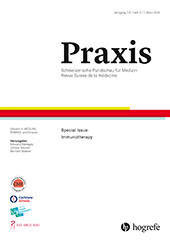Immunotherapies: How Do They Work?
Abstract
Abstract. The understanding of the immune system and the discovery of the proteins and processes involved in its regulation have enabled the emergence of new approaches against cancer. The development of antibodies (immune checkpoint inhibitors) able of blocking interactions that suppress the activation of T cells or their effector actions against cancer cells has modified the prognosis of several cancer forms. Bispecific antibodies as well as cellular immunotherapies (CARs/TILs) are new immunotherapy approaches that have already shown their effectiveness in certain onco-haematological diseases. Unfortunately, only a fraction of treated patients derives benefit from these treatments. The future challenge will be to understand the resistance mechanisms to immunotherapies so that treatment may be personalized for each patient.
Zusammenfassung. Das Verständnis des Immunsystems und die Entdeckung der Proteine und Prozesse, die an seiner Regulierung beteiligt sind, haben die Entwicklung neuer Ansätze zur Krebsbekämpfung ermöglicht. Die Entwicklung von Antikörpern (Immun-Checkpoint-Inhibitoren), die in der Lage sind, Wechselwirkungen zu blockieren, die die Aktivierung von T-Zellen oder deren Effektorwirkung gegen Krebszellen unterdrücken, hat die Prognose mehrerer Krebsarten verändert. Bispezifische Antikörper sowie zelluläre Immuntherapien (CARs/TILs) sind neue Immuntherapieansätze, die ihre Wirksamkeit bei bestimmten onkohämatologischen Erkrankungen bereits unter Beweis gestellt haben. Leider profitiert nur ein Bruchteil der behandelten Patientinnen und Patienten von diesen Behandlungen. Die künftige Herausforderung wird darin bestehen, die Resistenzmechanismen gegen Immuntherapien zu verstehen, um die Behandlungen für jede Patientin und jeden Patienten individuell anpassen zu können.
Résumé. La compréhension du fonctionnement du système immunitaire et la découverte des protéines impliquées dans sa régulation ont permis l’apparition de nouvelles approches pour traiter le cancer. Le développement d’anticorps (inhibiteurs des points de contrôle immunitaires) capables de bloquer les interactions réprimant l’activation des lymphocytes T ou leurs actions effectrices contre les cellules cancéreuses a modifié le pronostic de plusieurs formes de cancer. Les anticorps bispécifiques ainsi que les immunothérapies cellulaires (CARs/TILs) sont de nouvelles approches d’immunothérapies qui ont montré leurs efficacités dans certaines pathologies onco-hématologiques. Malheureusement, seule une fraction des patients traités tire un bénéfice de ces traitements. Le défi à venir sera de comprendre les mécanismes impliqués dans la résistance aux immunothérapies afin d’individualiser le traitement de chaque patient.
Bibliography
. I. The Treatment of Malignant Tumors by Repeated Inoculations of Erysipelas. Ann Surg. 1893;18:68.
. Cancer; a biological approach. I. The processes of control. Br Med J. 1957;1(5022):779–786.
. CD28 and CTLA-4 have opposing effects on the response of T cells to stimulation. J Exp Med. 1995;182(2):459–465.
. Induced expression of PD-1, a novel member of the immunoglobulin gene superfamily, upon programmed cell death. EMBO J. 1992;11(11):3887–3895.
. Neoantigens in cancer immunotherapy. Science. 2015;348(6230):69–74.
. Oncology Meets Immunology: The Cancer-Immunity Cycle. Immunity. 2013;39(1):1–10.
. Immune escape to PD-L1/PD-1 blockade: seven steps to success (or failure). Ann Oncol. 2016;27(8): 1492–1504.
. Molecular mechanisms of T cell co-stimulation and co-inhibition. Nat Rev Immunol. 2013;13(4):227–242.
, Immune Inhibitory Molecules LAG-3 and PD-1 Synergistically Regulate T-cell Function to Promote Tumoral Immune Escape. Cancer Res. 2012;72(4):917–927.
, Relatlimab and Nivolumab versus Nivolumab in Untreated Advanced Melanoma. N Engl J Med. 2022;386(1):24–34.



